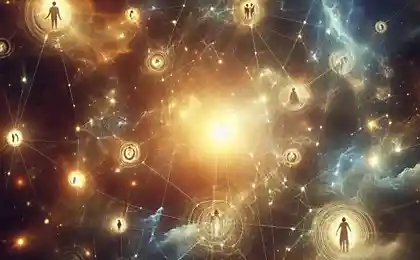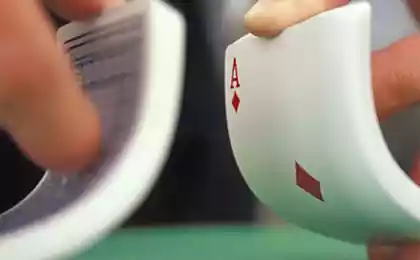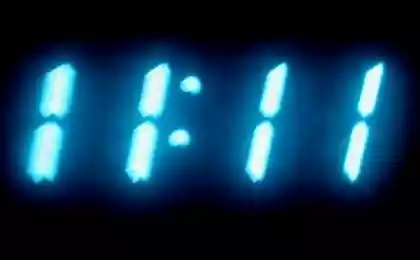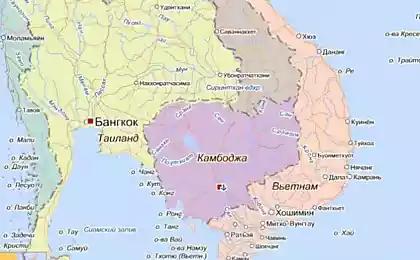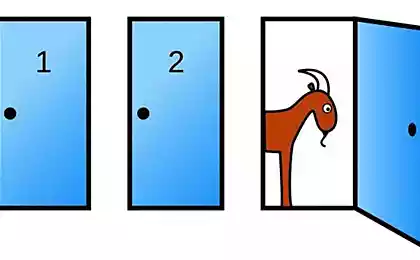1214
"The fact that in this world there can be no ..."
Dear friends, I am pleased to introduce you to another article in a series of his travels around the world wonder. We started by talking about numbers -giants , where I tried to share with you my admiration of what incredible magnitude of surround We in the universe and how close we can approach them to the very infinity. The second article describes of microscopically small objects , far beyond appearances, not only the naked eye, but also the most powerful microscope. Now I suggest you take a third trip - a journey into the world of probabilities. We'll see examples of incredible, but, nevertheless, is mathematically possible events. Once again, we have to work with numbers, so I apologize in advance from the humanities (unless, of course, there are those in this resource). In general, if you, like me, love to hammer head useless facts, then welcome.
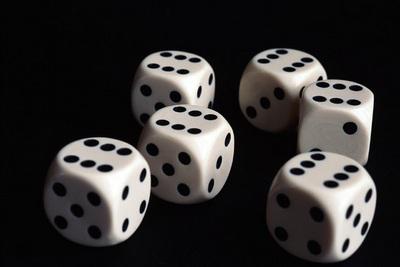
Let's briefly touch on that in general such likelihood. Often the term is misunderstood. Probability - a quantitative assessment of the probability of occurrence of some event. It can take values from zero to one. A common mistake that is committed, is that this assessment is made after the occurrence (or non-occurrence) of the event. Although in this case the probability of a kind of "collapses" and takes only one of two values: 0 or 1. That is, an event or come or not, and no payments are no longer being. A good illustration of this statement is a famous saying about the futility of waving fists after the fight.
Obviously, the events are more or less likely. I suggest a trip to these, the probability of which is so close to zero that much breathtaking. Of course, for this we need some knowledge about the world, numeracy and imagination. Not sure I have something else, or at least the third, but still let us begin.
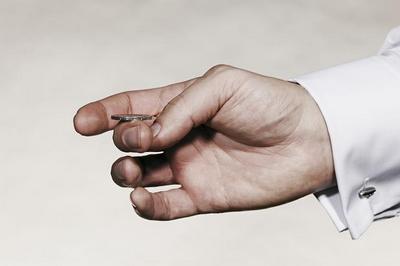
And we start with a probability of 0.5. These are the chances of finding a dinosaur in the street ("or a meeting, or a meeting") - known joke. But seriously, one of the most popular providers of this event is likely to ordinary coin. Quite often, decisions are made on the basis that it will fall on the heads or tails on. For example, in 1968 the European Championship semi-final football match between the national teams of the Soviet Union and Italy ended in a draw, and the outcome was settled coin toss. Incidentally, in the finals the Italians (and even became the champions of Europe) and our left without medals at all, and losing in a match for third place. That may be so insidious probability of 0.5.
However, even if the coin is the "ideal" and even if we throw it too "perfect" (which in the real world, of course, is unattainable), the probability that it will fall on the heads or tails will not be strictly equal to 0.5. The coin may be on edge - and it is quite possible situation, the likelihood of which is highly dependent on the thickness of the coin and a method throws. For a more or less standard coin rather about her can be assessed as "1 to 6000» , that you will agree, not so little. For example, if you make a million shots, you can expect that will rise on the edge of the coin 150 times. That is, it will happen about 1 every 2 days, if you throw the entire year to 8 hours every day. But if you want to wait that stood on the edge of a coin twice, then you have to throw coins at the same pace for about 35 years. In principle, for particularly stubborn people, it is also realistic.
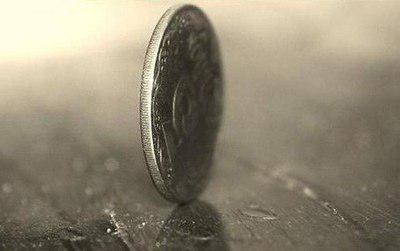
Of course, "one to two" or "one-to-six thousand" - it's interesting. With these events we face constantly. I am sure that you are expecting something more, so let's not waste any time and immediately made the jump to the probability of "a million to one." What events occur with this or something like this likely? This is a chance to win the grand prize in any lottery. For example, the chance to guess 6 numbers out of 45 is "1 in 8,145,060". It is worth to mention a funny incident that occurred in September 2009 in Bulgaria, when the lottery "6 out of 42» same winning numbers fell in two circulation consecutive (article contains probability of this "1 to 4.2 million," but personally I got a different meaning - "1 to 5245786"). You can still try to throw 9 dice, so that they all fell to the same value - "1 to 1,679,616." Or throw out 20 of the 20 eagles abandoned coins - "1 to 1,048,576." The probability of dying from the tsunami - "1 to 500,000." The chances of getting "Royal Flush" Poker is also roughly in this range - "1 to 649,740."
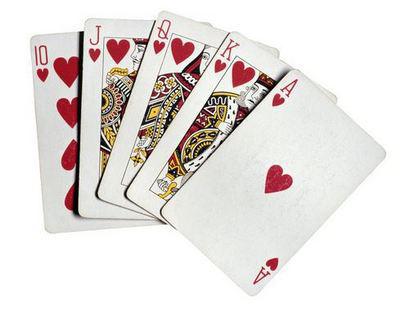
Generally, to the event with probability "one in a million" occurred at least once in your life, you need to "try" 50 times each day. For example, if we are crossing daily from 50 random people, then sometime during the life encounter with the chance meeting with that "one in a million." In principle, this value is close to that in which you can safely do not have to believe. While considering that the globe is home to more than 7 billion people, even such rare events on a daily basis with someone so occur.
Moving on to the even more incredible events, wait until that throughout their lives have exactly no sense. The probability of global catastrophe for civilization as a result of the fall of a large asteroid in a year - "one in 10 million" (though for one particular person a chance to die from an asteroid is "1 to 500 thousands", so be careful). The probability of the first attempt to find a needle in a haystack - approximately "100 million to 1" (if not the first, and subject to certain conditions, the can handle just 2 days ). Is it possible to accidentally collect disassembled 3x3x3 Rubik's Cube? Any particular arrangement has the chance to be right only "1 to 4.32 * 10 ^ 19", so that the assembly 26 years may require .
The probability of fire from an infinitely thin laser (these do not happen) to an arbitrary point in the sky and get "Voyager 1" - "1 to 5 * 10 ^ 26" (in the sun or the moon - "1 to 180 000"). And if you just poke a random point in the universe, then what you will get something with a probability of only "1 in 10 ^ 31." The probability of matching fingerprints from two different people - "1 in 10 ^ 60." The man does not know how to play chess, has a chance to win a grand master, "1 to 10 ^ 100", assuming that he would have to guess about 40 moves, each time doing one of the two or three suitable from 500 available to all (including those which do not comply with the rules).
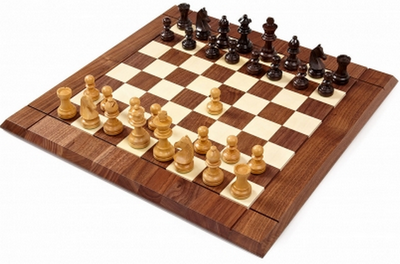
Let's make another qualitative leap to full improbability. The probability that pressing keys on the keyboard at random, we shall find the exact text of the article (in which about 11 000 characters) is "1 in 40 ^ 11,000." This number, wherein after the zero point, and 17 622 are still zero and then some significant digits. This is an extremely low probability, so you can be sure that I do my best to write something meaningful, not just randomly knock on the keyboard.
If we take as an illustration of an example, which has already become a certain standard, then let me remind you that the probability of randomly print the original text of "Hamlet" is about "1 in 10 ^ 183946." This number is in any practical sense is zero, and it will not grow any tangible, even if we fill the whole universe typewriters Planck size and wait time comparable with the time of her life. The problem with these numbers is that they are so small that they simply do not compare, but to others, just as unrealistic. And not have to compare the numbers themselves, and their exponents in the denominator. And remember, even if the figure is 6, the event is almost certainly not going to happen during the life of one person.
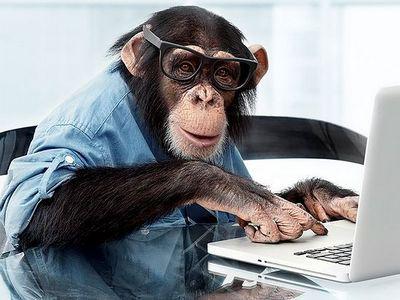
Chances for ejected into space a person to be chosen randomly overflying a starship for 30 seconds, as you know, is "1 to 2 ^ 267709" or "1 in 10 ^ 80 588" ("The Hitchhiker's Guide to the Galaxy", D.Adams). Another popular example is the probability that all the air in the room where you are, at random will meet in one of its halves. Mathematically, it is possible, and no physical laws prohibiting the distribution of molecules is - no. The probability of this for a room of 40 cubic meters is approximately equal to "1 to 2 ^ 10 ^ 27" (in the denominator we have here a deuce in octillion degree - it impresses you?) Or "1 in 10 ^ 10 ^ 26.5." This number is much closer to zero than any of the previous. In order to somehow work with him, we have to use a calculator wonderful WolframAlpha .
And another example of pursuit. Scoop from the lake 10-liter bucket of water. It can thus be that all the water in it will be "heavy" (in which instead of hydrogen to deuterium - its isotope with an atomic mass equal to 2)? For the record: the content of heavy water in ordinary - 1 molecule at 5 500, and a bucket of water for about 10 ^ 27 molecules. We get the probability of "1 to 5500 ^ 10 ^ 27" or "1 in 10 ^ 10 ^ 27.5." Note that in the previous example, we raised by the two, and this "5500" - and nevertheless got similar results. This happened because the exponents have been surprisingly high. The level of 10 ^ 27, in principle, still a number of build (if it is a little more than 1), - the results will be equally huge.

We are about to complete, so strained the imagination for the last time and imagine that we have dismantled the entire observable universe cubes Planck volume (assuming they were all different), then how should they re-mixed and were placed in random order. What is the likelihood that they stand each in his place? It is equal to "1 to (10 ^ 185)" or "1 in 10 ^ 10 ^ 187." I think that this number is close enough to zero to stop it.
If you have examples of what some amazing events and coincidences, I will be grateful if you write them in the comments. And yet, according to his custom, I would ask dear readers to point out the errors and inaccuracies herein. From my previous text, you are likely to understand that I am not a physicist, and I guess that now you zakradutsya suspicion that I'm not a mathematician, too. It's true. So there is certainly an error. I'd like to fix them and learn something.
Source: geektimes.ru/post/259090/

Let's briefly touch on that in general such likelihood. Often the term is misunderstood. Probability - a quantitative assessment of the probability of occurrence of some event. It can take values from zero to one. A common mistake that is committed, is that this assessment is made after the occurrence (or non-occurrence) of the event. Although in this case the probability of a kind of "collapses" and takes only one of two values: 0 or 1. That is, an event or come or not, and no payments are no longer being. A good illustration of this statement is a famous saying about the futility of waving fists after the fight.
Obviously, the events are more or less likely. I suggest a trip to these, the probability of which is so close to zero that much breathtaking. Of course, for this we need some knowledge about the world, numeracy and imagination. Not sure I have something else, or at least the third, but still let us begin.

And we start with a probability of 0.5. These are the chances of finding a dinosaur in the street ("or a meeting, or a meeting") - known joke. But seriously, one of the most popular providers of this event is likely to ordinary coin. Quite often, decisions are made on the basis that it will fall on the heads or tails on. For example, in 1968 the European Championship semi-final football match between the national teams of the Soviet Union and Italy ended in a draw, and the outcome was settled coin toss. Incidentally, in the finals the Italians (and even became the champions of Europe) and our left without medals at all, and losing in a match for third place. That may be so insidious probability of 0.5.
However, even if the coin is the "ideal" and even if we throw it too "perfect" (which in the real world, of course, is unattainable), the probability that it will fall on the heads or tails will not be strictly equal to 0.5. The coin may be on edge - and it is quite possible situation, the likelihood of which is highly dependent on the thickness of the coin and a method throws. For a more or less standard coin rather about her can be assessed as "1 to 6000» , that you will agree, not so little. For example, if you make a million shots, you can expect that will rise on the edge of the coin 150 times. That is, it will happen about 1 every 2 days, if you throw the entire year to 8 hours every day. But if you want to wait that stood on the edge of a coin twice, then you have to throw coins at the same pace for about 35 years. In principle, for particularly stubborn people, it is also realistic.

Of course, "one to two" or "one-to-six thousand" - it's interesting. With these events we face constantly. I am sure that you are expecting something more, so let's not waste any time and immediately made the jump to the probability of "a million to one." What events occur with this or something like this likely? This is a chance to win the grand prize in any lottery. For example, the chance to guess 6 numbers out of 45 is "1 in 8,145,060". It is worth to mention a funny incident that occurred in September 2009 in Bulgaria, when the lottery "6 out of 42» same winning numbers fell in two circulation consecutive (article contains probability of this "1 to 4.2 million," but personally I got a different meaning - "1 to 5245786"). You can still try to throw 9 dice, so that they all fell to the same value - "1 to 1,679,616." Or throw out 20 of the 20 eagles abandoned coins - "1 to 1,048,576." The probability of dying from the tsunami - "1 to 500,000." The chances of getting "Royal Flush" Poker is also roughly in this range - "1 to 649,740."

Generally, to the event with probability "one in a million" occurred at least once in your life, you need to "try" 50 times each day. For example, if we are crossing daily from 50 random people, then sometime during the life encounter with the chance meeting with that "one in a million." In principle, this value is close to that in which you can safely do not have to believe. While considering that the globe is home to more than 7 billion people, even such rare events on a daily basis with someone so occur.
Moving on to the even more incredible events, wait until that throughout their lives have exactly no sense. The probability of global catastrophe for civilization as a result of the fall of a large asteroid in a year - "one in 10 million" (though for one particular person a chance to die from an asteroid is "1 to 500 thousands", so be careful). The probability of the first attempt to find a needle in a haystack - approximately "100 million to 1" (if not the first, and subject to certain conditions, the can handle just 2 days ). Is it possible to accidentally collect disassembled 3x3x3 Rubik's Cube? Any particular arrangement has the chance to be right only "1 to 4.32 * 10 ^ 19", so that the assembly 26 years may require .
The probability of fire from an infinitely thin laser (these do not happen) to an arbitrary point in the sky and get "Voyager 1" - "1 to 5 * 10 ^ 26" (in the sun or the moon - "1 to 180 000"). And if you just poke a random point in the universe, then what you will get something with a probability of only "1 in 10 ^ 31." The probability of matching fingerprints from two different people - "1 in 10 ^ 60." The man does not know how to play chess, has a chance to win a grand master, "1 to 10 ^ 100", assuming that he would have to guess about 40 moves, each time doing one of the two or three suitable from 500 available to all (including those which do not comply with the rules).

Let's make another qualitative leap to full improbability. The probability that pressing keys on the keyboard at random, we shall find the exact text of the article (in which about 11 000 characters) is "1 in 40 ^ 11,000." This number, wherein after the zero point, and 17 622 are still zero and then some significant digits. This is an extremely low probability, so you can be sure that I do my best to write something meaningful, not just randomly knock on the keyboard.
If we take as an illustration of an example, which has already become a certain standard, then let me remind you that the probability of randomly print the original text of "Hamlet" is about "1 in 10 ^ 183946." This number is in any practical sense is zero, and it will not grow any tangible, even if we fill the whole universe typewriters Planck size and wait time comparable with the time of her life. The problem with these numbers is that they are so small that they simply do not compare, but to others, just as unrealistic. And not have to compare the numbers themselves, and their exponents in the denominator. And remember, even if the figure is 6, the event is almost certainly not going to happen during the life of one person.

Chances for ejected into space a person to be chosen randomly overflying a starship for 30 seconds, as you know, is "1 to 2 ^ 267709" or "1 in 10 ^ 80 588" ("The Hitchhiker's Guide to the Galaxy", D.Adams). Another popular example is the probability that all the air in the room where you are, at random will meet in one of its halves. Mathematically, it is possible, and no physical laws prohibiting the distribution of molecules is - no. The probability of this for a room of 40 cubic meters is approximately equal to "1 to 2 ^ 10 ^ 27" (in the denominator we have here a deuce in octillion degree - it impresses you?) Or "1 in 10 ^ 10 ^ 26.5." This number is much closer to zero than any of the previous. In order to somehow work with him, we have to use a calculator wonderful WolframAlpha .
And another example of pursuit. Scoop from the lake 10-liter bucket of water. It can thus be that all the water in it will be "heavy" (in which instead of hydrogen to deuterium - its isotope with an atomic mass equal to 2)? For the record: the content of heavy water in ordinary - 1 molecule at 5 500, and a bucket of water for about 10 ^ 27 molecules. We get the probability of "1 to 5500 ^ 10 ^ 27" or "1 in 10 ^ 10 ^ 27.5." Note that in the previous example, we raised by the two, and this "5500" - and nevertheless got similar results. This happened because the exponents have been surprisingly high. The level of 10 ^ 27, in principle, still a number of build (if it is a little more than 1), - the results will be equally huge.

We are about to complete, so strained the imagination for the last time and imagine that we have dismantled the entire observable universe cubes Planck volume (assuming they were all different), then how should they re-mixed and were placed in random order. What is the likelihood that they stand each in his place? It is equal to "1 to (10 ^ 185)" or "1 in 10 ^ 10 ^ 187." I think that this number is close enough to zero to stop it.
If you have examples of what some amazing events and coincidences, I will be grateful if you write them in the comments. And yet, according to his custom, I would ask dear readers to point out the errors and inaccuracies herein. From my previous text, you are likely to understand that I am not a physicist, and I guess that now you zakradutsya suspicion that I'm not a mathematician, too. It's true. So there is certainly an error. I'd like to fix them and learn something.
Source: geektimes.ru/post/259090/




